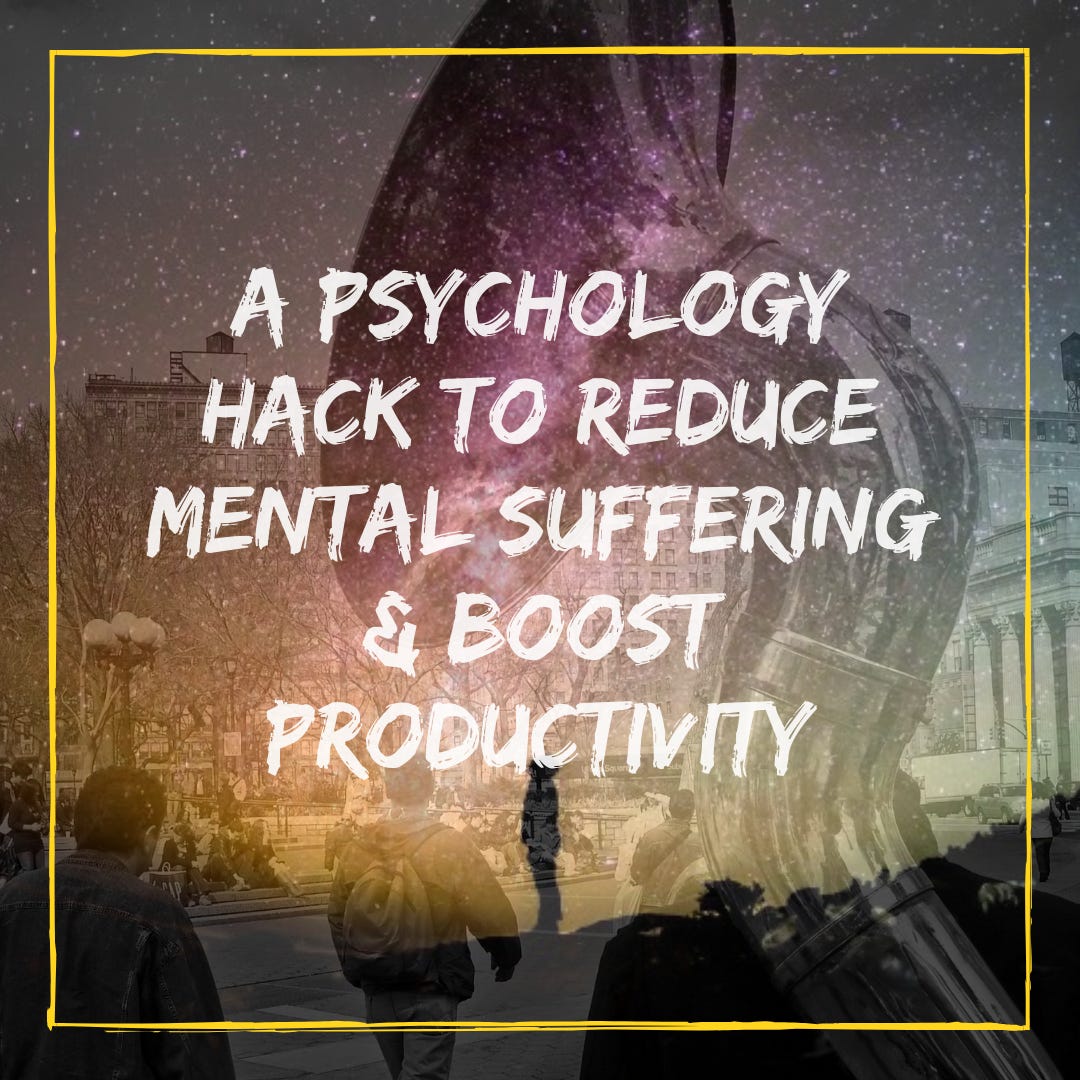A Mindset of Indulgence Can Improve Your Metabolic Health
Description
Last time, we discussed how letting go of our sense of self can significantly impact our lives by reducing mental suffering, improving productivity, and helping us experience the benefits of awe. This week, we’ll explore another question together:
Can our mindsets make us healthier?
Our beliefs can indeed exert surprising physiological effects. A recent randomized clinical trial discovered that educating children about the side effects of allergy immunotherapy greatly improved patient compliance and parental anxiety during treatment for peanut allergies.
Oral immunotherapy is an emerging treatment for allergies in which patients are given gradually larger doses of an allergen in order to promote immune tolerance. The appearance of mild reactions to treatment like a scratchy throat or congestion can sometimes concern children and parents alike since these symptoms closely resemble those of a more severe allergic reaction like anaphylaxis.
The anxiety can be so great that families may skip doses or stop treatment completely. In the study, telling children that side effects may be beneficial and even help overcome allergy in the long term allowed kids to successfully complete treatment and experience fewer side effects when exposed to actual peanuts.
Why might a positive mindset change our response to something like allergens? Let’s dive a little deeper to find out.
Mindsets 101
Our mindsets affect our perceptions of reality and are influenced by our upbringing, cultural values, and environments. Marketing, advertising, and health influencers shape our attitudes towards foods, exercise plans, and lifestyle practices.
Many of our mindsets are simply the result of mimetic desire, meaning we imitate what others want. We desire what is socially desirable. Mimetic desire describes how social influences like parents, peers, teachers, media, and society impact nearly all our decisions from our career aspirations to the partners we choose.
Dr. Alia Crum, Professor of Psychology at Stanford, studies how mindsets affect health and physical performance. She defines mindsets as core beliefs or assumptions about a domain. Whether we think stress is enhancing or debilitating influences the outcomes that follow. Whether we believe the nature of intelligence is fixed or malleable affects motivation and the ability to persist during academic challenges.
Mindset vs. Placebo
While the origins of the placebo effect may have been based on insufficient evidence, science suggests that the way we feel about something does in fact impact the way it affects us. We often forget that the total effect of a medical treatment is a combination of the chemical properties of that drug plus the placebo effect, which consists of social context, beliefs or mindsets, and our body’s natural physiological ability to heal.
Mindset and Food Metabolism
Do our beliefs change our bodies’ physiological response to food?
Dr. Crum conducted a well-known study, sometimes called the “milkshake study,” in which she administered identical vanilla milkshakes to the same group of people separated by a week. Participants were initially told they were drinking a calorie-rich, indulgent milkshake full of fat and sugar. The second time, volunteers were told they were drinking a healthy, sensible, nutritious meal shake.
Levels of a gut hormone called ghrelin were measured before and after drinking each set of milkshakes. Sometimes called the “hunger hormone,” ghrelin signals to the hypothalamus in the brain that it’s time to seek out food. After a large meal, ghrelin levels drop, telling your body that you’ve eaten enough.
Scientists originally thought that ghrelin levels fluctuated in response to nutrient intake alone. Eat a cheeseburger, and ghrelin levels drop substantially. Eat a salad? Not so much. But Crum discovered something else entirely in her milkshake study.
She found that telling people that they were drinking something indulgent caused their ghrelin levels to drop threefold more than when they thought they were drinking a low-calorie shake. In other words, simply believing that they were consuming something filling caused their bodies to respond as if they actually were.
This evidence suggests that we may be able to manipulate metabolism with our mindsets. Crum argues that these findings require us to rethink our traditional metabolic model of “calories in, calories out,” which doesn’t account for the influence of mindset on physiology. According to Crum,
“Our beliefs matter in virtually every domain, in everything we do. How much is a mystery, but I don't think we've given enough credit to the role of our beliefs in determining our physiology, our reality.”
Should we cultivate mindsets of abundance?
Counterintuitively, the belief that we’re eating indulgent foods rather than healthy ones seems to result in improved satiety and better health outcomes. The reason we observe this correlation may be due to the power of abundance and scarcity mindsets. Stephen Covey was the first to coin these terms in his seminal book, The 7 Habits of Highly Effective People.
The scarcity mindset is grounded in destructive competition and subscribes to the idea that opportunity is a finite pie such that if one person takes a large piece, there is less available for everyone else. Individuals with an abundance mindset, on the other hand, reject the notion of zero-sum games and believe there is more than enough to go around.
An abundance mindset allows us to celebrate the successes of others and share profits, power, and recognition. According to Covey, embracing an abundance mindset allows for freedom and mental clarity, which enables us to more effectively pursue our goals. Similar mechanisms may be at play when we consume food from a mindset of indulgence.
The calmness that accompanies the belief that we have more than enough to eat may lead to lower levels of the stress hormone cortisol, thereby preventing excessive ghrelin stimulation and the urge to overeat. In other words, operating from a mental place of abundance or indulgence may reduce chronic stress and therefore improve our metabolic health.
If an indulgence mindset can promote health, can actually consuming indulgent foods also lead to health benefits? Unfortunately, the science suggests otherwise. A 2020 review article published in the journal Nutrition Research described how satiety cues that promote a sense of fulness and satisfaction typically inhibit cravings for more food.
But Western diets rich in energy, sugar, and saturated fats seem to impair these inbuilt mechanisms of appetite reduction by hijacking our brain’s reward pathways and inappropriately releasing dopamine to reinforce behaviors. So how can we restore normal appetite regulation and cultivate a healthier relationship with food? Intuitive eating may provide a possible answer.
Can we make eating more intuitive?
Stress reduction may be one of the mechanisms by which intuitive eating improves well-being. Intuitive eating relies on a skill called interoception, which describes our ability to sense internal signals from our bodies. Interoception originates in the insular cortex of the brain and can help us register the sensation of hunger or predict our approximate heart rate.
Intuitive eating relies on satiety and appetite signals to guide eating habits instead of using emotional, social, or chronological cues. Interoceptive sensitivity has been associated with healthier BMIs, higher levels of self-esteem, and reduced incidence of disordered eating patterns compared to other dieting methods.
Many of us may have a reduced capacity for interoception due to chronic pain or trauma, a tendency to suppress emotions, or eating to always clean our plates instead of eating until we’re full. Retraining our bodies to perceive and respond to physiological signals can help reduce cravings and improve self-regulation.
Dr. Kent Berridge, a professor of psychology and neuroscience at the University of Michigan, recommends that we “allow the craving to happen; just notic





















